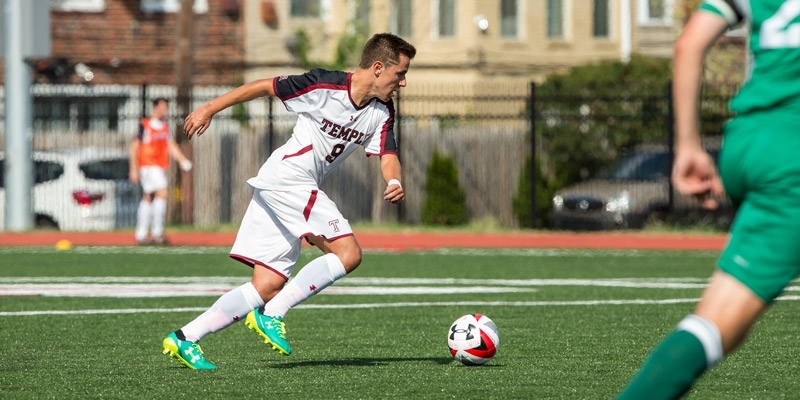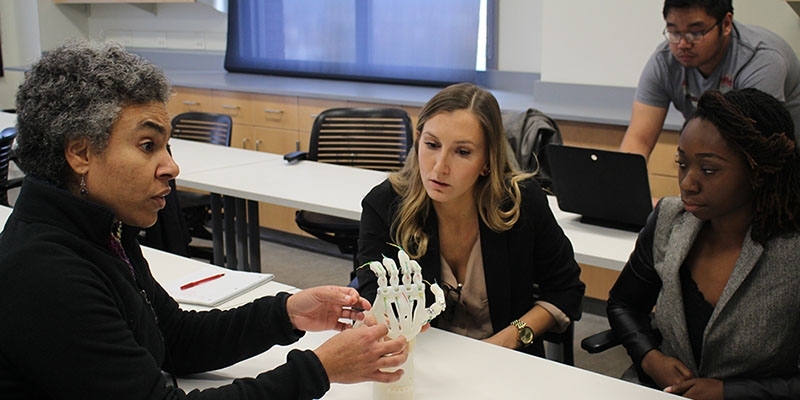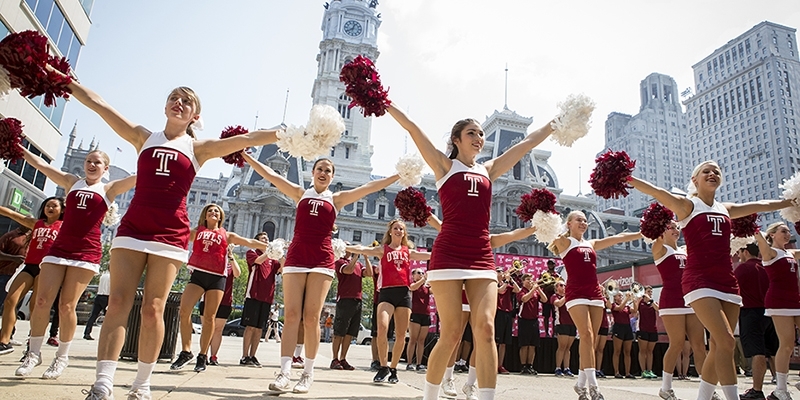Student-athletes score highest GPAs ever
Student-athletes balance an impressive amount of responsibility and were able to achieve the highest cumulative grade point average on record last semester.

It’s 5:45 a.m. and Alex Cagle is awake. He has to be in the locker room by 6:20 a.m. After a few hours on the field for soccer practice, he might squeeze in a quick breakfast—usually a protein shake—but only if there’s time.
Then, the senior environmental science major powers through three or four hours of class. Sometimes he takes a short break—maybe 30 minutes—before popping into the lab to research microbiological pathogens. The rest of the day goes to homework and studying. On an average night, Cagle’s head doesn’t hit his pillow until at least midnight.
A schedule like Cagle’s isn’t something many envy, but it’s a schedule that student-athletes know extremely well. Despite juggling a multitude of responsibilities, though, Temple’s student-athletes continue to succeed academically. Last semester, Owls set a new record with a combined cumulative grade point average of 3.12.
“These students are performing well with considerable demands on their time outside of the classroom, said Justin Miller, senior director of the Nancy & Donald Resnick Academic Support Center for student-athletes. “It takes a special commitment to balance the Division I student-athlete experience. I don’t know how they are able to manage it all."
Miller is being modest—no one could be more impressed with or proud of Temple’s student-athletes than he is. The environment that he has created at the Resnick Center plays a crucial role in student success.
“This center has been one of the greatest resources off the soccer field because there’s everything from tutoring to mentors,” Cagle said. “We have a lot of help coming our way and there are a lot of people who want to see you succeed in the classroom.”
Tucked inside Pearson Hall, the center hums with life. Every door is always open, from the advisors’ to Miller’s. Computers and printers and available, making for an ideal studying environment. Sitting in Miller’s office, Cagle looks like he is home, even if this home is hundreds of miles away from his family in Wisconsin.
“One thing that I’ve tried to do is shift the perception that this center is only a football or basketball space, or only for students who need help,” Miller said. “We’re shifting from that to providing opportunity for everyone. We create a community here.”
It’s agreed among coaches and advisors that academic success is always the priority. To keep academics at the forefront, every team is assigned to an advisor, and every coach is required to meet with their team’s respective advisor weekly to review the team’s academic performance.
“The philosophy is ‘It takes a village’...we are all working together here,” Miller said.
The realm of support that the center offers extends beyond the classroom and into the world of careers. Through a partnership with the Career Center, an assigned career coach for student-athletes holds office hours each week at Resnick.
“We provide the resources because the students have serious time constraints,” Miller said.
The career coaching pays off—and that’s been especially true for Cagle. He’s been interested in the environmental sciences since high school and wants to find a career in exploring how the sciences and corporate America interlap.
Last spring, when the soccer demands are lighter, Cagle had the opportunity to intern with an energy consulting firm in New York that helped bring large-scale renewable energy projects to Africa and third-world countries.
This semester, he’s interning with a consulting company in Philadelphia that works to incorporate sustainability practices into large-scale businesses.
“Justin and his team put together a lot of opportunities for you to see and get in contact with employers and see the different careers you might want to get into. It’s been really beneficial,” Cagle said.
That ability to help students in the classroom and beyond is part of why Miller enjoys his work so much.
“That’s why I love what I do—the personal connection. I’m able to build good relationships, let [students] know someone is going to hold them accountable,” Miller said. “And when they hit that certain level, I’m going to push them in every way, shape and form that I can.”


